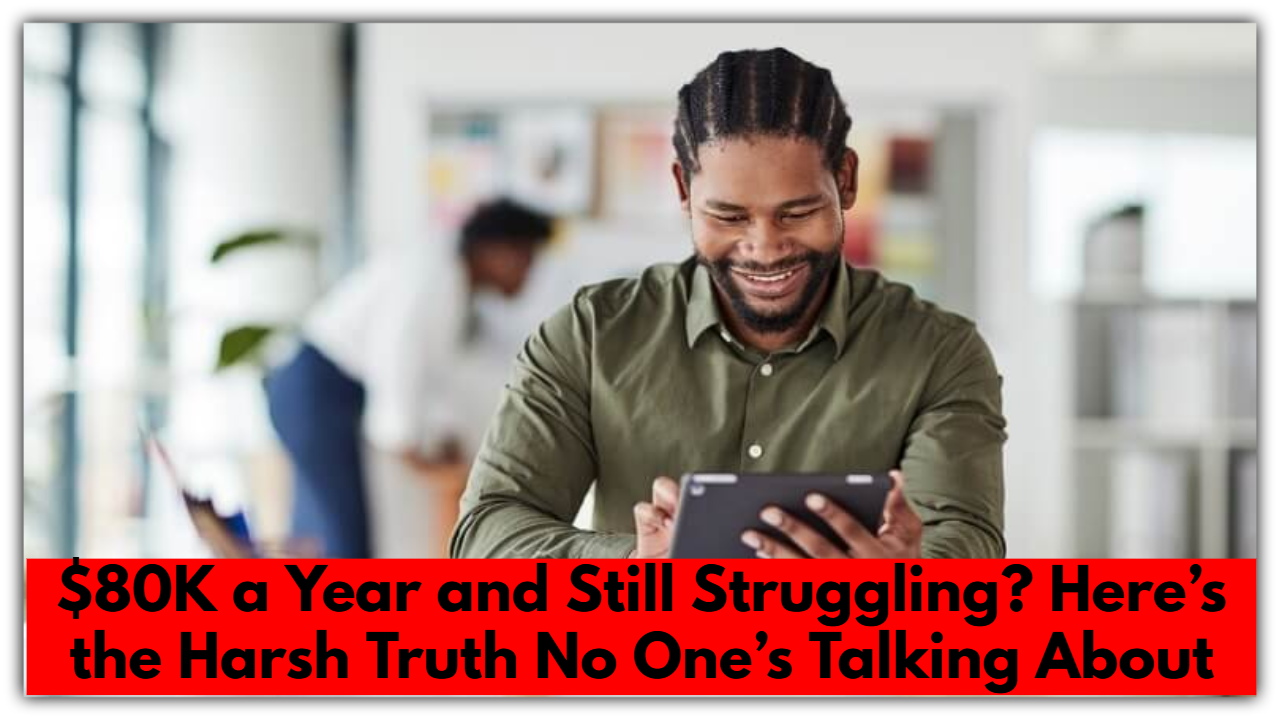$80K a Year and Still Struggling? Here’s the Harsh Truth No One’s Talking About
You’ve probably heard it before — “$80,000 a year is a great salary!” And on paper, it is. It sounds like you should be doing well. Maybe even thriving.
But here you are, making close to that — or maybe a bit less — and still feeling like you can barely breathe financially. And if you’ve ever caught yourself thinking, “Why does it still feel this hard?” — you’re not imagining it.
The truth is, in 2025, $80K just doesn’t go as far as it used to. And in every single U.S. state — yes, even the cheap ones — that income doesn’t stretch enough to give you what most people would consider a “comfortable” life anymore.
Let’s talk about why that is, and more importantly, what you can actually do about it.
So… What Does “Comfortable” Even Mean?
We’re not talking about living large. No luxury cars. No five-star vacations. Just simple, real comfort.
-
A roof over your head that doesn’t stress you out
-
Groceries in the fridge without checking your bank app
-
Bills paid without juggling due dates
-
A little something set aside for savings
-
And maybe some room to enjoy life — dinner out, a weekend away, something fun
That used to be achievable with $80K. Not anymore.

Why $80K Doesn’t Cut It Anymore — Anywhere
1. Rent’s Out of Control
If you rent, you already know this. Average rent in the U.S. right now is over $2,000 a month. That’s $24K a year — just to live in a place that isn’t falling apart. If you’re in a big city, forget it. Rent alone might be eating 40–50% of your income.
2. Groceries, Gas, and Everything Else Costs More
A couple of years ago, $100 at the grocery store used to fill a cart. Now? You’re lucky if it covers the basics for the week.
Gas? Up.
Utilities? Up.
Streaming subscriptions? Even those sneaky little monthly charges are creeping higher. It’s all adding up.
3. Health Insurance Doesn’t Mean Affordable Healthcare
Even with insurance, a couple of doctor visits, a prescription, or one emergency room trip can mess with your whole month’s budget.
4. “Cheaper States” Aren’t The Magic Fix
You might think, “I’ll just move somewhere cheaper.” But the reality is: those places often come with lower-paying jobs, higher transportation costs, or fewer services. What you save on rent, you might lose on wages or opportunity.
What the Numbers Say (And Yeah, It’s Pretty Bleak)
Multiple studies have looked into what it actually takes to live comfortably in the U.S. right now. Here’s the deal:
-
Even in the cheapest states, you’d need around $78,000–$85,000 a year to live what they call “comfortably.”
-
In the more expensive places — California, New York, Hawaii — you’re looking at $110,000 or more just to breathe easily.
Meanwhile, the average salary in the U.S. is still only around $62,000. So if you’re under $80K, it makes sense that life feels like a grind.
Let’s Talk About the Stress
This isn’t just about paying bills. This is about mental weight.
-
You’re working hard, maybe even working more than one job.
-
You’re not being irresponsible — but you still can’t save much.
-
Emergencies feel like financial disasters.
-
You feel like you’re treading water while everyone else is moving ahead.
It’s exhausting. And it’s not your fault.
What Can You Do About It?
You’re not powerless, but it’s going to take intention. Here’s what might actually help:
1. Get Clear on What Life Actually Costs
Use a budget app or cost-of-living calculator for your zip code. You might find you’re spending more than you realize in places that could be adjusted.
2. Try to Grow Your Income (Even a Little)
Whether it’s asking for a raise, switching jobs, freelancing, or learning a new skill — even an extra $500 a month can make a difference. That extra breathing room matters.
3. Rethink What “Success” Looks Like
If moving to a smaller home or living in a quieter town helps you sleep better at night — that’s success. Sometimes it’s not about more money, but smarter trade-offs.
4. Don’t Compare Your Life to Instagram
You’re seeing someone’s filtered highlight reel. You’re living real life. If $80K isn’t getting you as far as you hoped, that’s not a personal failure — that’s a systemic shift.
You’re Not Alone — And You’re Not Crazy
You’re not bad with money. You’re not lazy. You’re not doing anything wrong.
You’re just living in a time where the cost of living exploded — and salaries didn’t. The math doesn’t add up anymore, and no amount of budgeting can magically fix that.
So if you’re frustrated, tired, or even a little scared about the future — you’re not alone. Millions of people are right there with you.
But here’s the good news: now that you know the truth, you can start making smarter choices, on your terms — not based on outdated ideas of what “should” be enough.
You deserve a life that feels less like surviving and more like living. And even if it takes some time, that’s still worth working toward.


Comments are closed, but trackbacks and pingbacks are open.